- Home
- A. G. Riddle
Winter World Page 10
Winter World Read online
Page 10
It’s like déjà vu, watching the rocket launch and disappear from ground view. Then Harry’s voice comes over the comm. “I’m okay. Feel like a pancake. But a one-piece pancake.”
I’m laughing at that when ground control says, “Pad 39C, you are go for launch.”
A countdown starts. Thirty minutes. Then ten. One minute.
“Dr. Sinclair, prepare for liftoff.”
My body tingles, my palms begin to sweat, and I’m looking around the capsule in a daze.
“Dr. Sinclair?”
“I copy.” A second passes. “I’m ready.”
Ready as I’ll ever be.
The rocket creaks, metal groaning like a robot waking up from hibernation.
Ten.
Nine.
Eight.
Seven.
The countdown voice sounds far away.
I don’t hear six at all—the capsule shakes like a condo in an earthquake.
And then boom, the rocket is moving, and moving fast. The beginning looked so slow on the screens, but right now it feels as if I’m on an amusement park ride that has gone off the rails. It’s exciting for about two seconds, and then I can hardly breathe, the weight of an elephant on my chest, grinding me into the seat. I can’t think, can barely see.
All that cramming of launch training before? Useless. I couldn’t bail out of this thing if I wanted to. Forget an emergency landing.
It doesn’t matter. The view out the porthole turns to white. I’m in the atmosphere.
Seven minutes later, I’m in orbit. The chaos and noise of the launch turns to silence. I unstrap myself. The elephant on my chest is gone. I’m as light as a feather.
I hear what sounds like two soft gunshots near the back of the capsule. The rocket detaching.
“Dr. Sinclair, do you copy?”
I want to say something clever, for the sake of my crewmates—and Andy Watts, who’s the last American still waiting to launch. But I can’t. I just stare out the round porthole, down at Earth, feeling smaller than I ever have before, more inconsequential. I have truly left the world, probably for the last time. A sense of calm comes over me, and with it, focus.
“Dr. Sinclair.”
“I’m here. Just enjoying the view.”
Cheers sound in my earpiece. I barely hear them. Right now, all I can think about is all I’ve left behind. A mess of a life. Some hard decisions. One I regret, that cost me everything.
None of it matters up here. Only the mission. Everything in my life has led to this moment. Though the weight of the launch acceleration is off my chest, I feel the weight of what I must do up here, the pressure not to fail. They’re all depending on me. Alex and his wife and children. Fowler. Everyone I’ve ever known.
Fowler’s voice sounds in my earpiece. “James.”
Something in his tone tells me this is a private channel. A glance at the closest screen confirms it.
“I read you.”
“Your capsule is in close proximity to Commander Matthews.”
He doesn’t ask. Doesn’t need to.
“Good. I’m ready.” I drift back to the harness and strap myself in.
“We’re going to drain the atmosphere in the capsule slowly. Her capsule is depressurized. That will prevent unexpected complications when you dock.”
The capsule lurches. The environmental screen shows the atmospheric pressure dropping. A critical alert is silenced.
The ground control tech’s name is Martinez, I think. His tone is more business-like than Fowler’s. “Status, Dr. Sinclair?”
“Nominal. Suit is good.”
“Stand by for docking in sixty seconds.”
Through the porthole, another capsule comes into view. It’s white and cylinder-shaped like mine, but with black marks dotting it, a Dalmatian print. I realize the dark marks are the stains of debris impacts. I lean forward, trying to catch a glimpse of Matthews through the other porthole. Nothing.
“Brace for impact, Dr. Sinclair.”
The words no astronaut wants to hear. Ever.
The impact, as it turns out, is a soft bump.
Even through the suit, I can hear the clumps of the airlocks meeting and joining.
“You’re clear, Dr. Sinclair. Good luck.”
I unsnap myself from the harness and push off hard toward the hatch. I turn the handle quickly, sensing that time is of the essence. If a debris field collides with us now, I figure we’re both finished.
My heart races, the sound thumping in my ears. I feel like a man digging up a grave where someone has been buried alive.
The hatch swings open, revealing the exterior of Matthews’s capsule, black pockmarks and all. This is where it gets dicey. I float out and grab the wheel of the other hatch. If it doesn’t turn, that’s it: no getting Emma Matthews out of this airless grave in the vacuum of space.
I pull, but it doesn’t budge. I try again, and it still won’t move. The hatch must have been hit by debris.
“Status, Doctor?”
I’m panting now. “Call back later.”
I strain again.
“James.” Fowler’s voice stops me. I pant and listen.
“Is it the hatch?”
I glance back at the cameras. They said they were going to disable them because the data moving between the capsules and the ground could put us at risk like the ISS. Fowler must have guessed.
“Yeah. It’s jammed.”
“There’s a tool that could help. Find the case marked ‘Supply 1A.’ You’ll know the tool when you see it.”
I drift back into my capsule, throw open the case, and see it immediately. It’s like a tire tool for space capsules, angled to lock on to the hatch wheel. It has a long handle with a wide plate for my feet. There’s no instruction manual, but I don’t need one. The gluteus maximus is the largest muscle in the body. One of the strongest, too—responsible for hip extension, which occurs every time we run, jump, or climb stairs. The average person can leg press a great deal more than they can bench press or curl.
I return to the hatch, hook the tool to the wheel, and plant my shoulders against the wall and my feet on the plate, trying to optimize my position for maximum thrust. I push.
Nothing.
“James?”
“I found the tool. Working on it.”
“Understood.”
I wait to catch my breath, then push with all my might. My glutes burn. Legs shake. And slowly, metal groans.
The hatch gives, my legs fly off the plate, and I spin. I panic for a moment, afraid I’ve ripped my suit in my depressurized capsule. But there’s no rush of air. Nevertheless, I do a quick inspection. The suit’s okay.
That was close. I need to be more careful.
When I catch my breath again, I try to calm my voice. “Got movement on the hatch.”
I can turn it with my hands now, though there’s a hard part with each rotation.
I stand clear as it swings open, but no atmosphere escapes.
I peer inside. Two bodies. Neither moving. Or acknowledging me.
They didn’t tell me there were two of them. Only about Matthews.
“Entering other capsule.” I pause. “I see two suits. Neither has responded to the hatch opening.”
“Understood, Dr. Sinclair. We’ve been unable to communicate with Commander Matthews for ninety minutes. The other crewmember died during the ISS catastrophe.”
“Should I…”
Fowler saves me from asking. “No, James. You’ll have to leave him. Space constraints.”
“Copy that.”
I study the two suits. It’s clear now: one is sunken in places, like a deflated balloon.
I grab Matthews and turn her toward me. Her suit looks fine. Through the clear glass, I see her face, eyes closed, blond hair framing her face. Even seemingly frozen in place, she has an irresistible aura, one that draws you in.
I push her ahead of me, through the connected airlocks. I close the one to my capsule behind me.
“Stand by, Doctor. We’re undocking you and re-pressurizing your capsule.”
“Copy.”
I pop open the med kit. My mind rifles through what could be going on with her. Suit has pressure. She hasn’t asphyxiated—unless there was a malfunction. How long has it been since she last ate? Too long, probably.
I take stock of the kit. As usual, they’ve thought of it all.
“Capsule pressure is nominal, Dr. Sinclair. Remove her helmet and commence first aid.”
As soon as I get her helmet off, I hold two fingers to her neck.
My heart sinks when I feel how cold her skin is.
Chapter 23
Emma
I awake with a mask over my mouth and a man squeezing an attached plastic bag, pumping air into me.
My chest burns. Throat throbs.
He takes the mask away and studies my face. “Commander Matthews, can you hear me?”
My voice is scratchy, barely audible. “Yeah.”
He holds a bottle to my lips. “Drink this, okay? It’ll help.”
I nod, and he squeezes the liquid into my mouth—a salty, sugary mix that must be glucose, sodium, and other electrolytes. It’s like balm on my burning throat, coating and soothing.
His helmet is off. His eyes pan away from me. I can tell he’s speaking into the headset. “Goddard, we’re okay here. I think she’s just dehydrated and malnourished. Borderline hypothermic from the reduced environmental output on the capsule and low blood sugar and electrolyte imbalance.”
A few seconds pass, him listening to Goddard’s reply. I study him as I gulp down the liquid. His face is lean and unlined except for a few shallow creases radiating from his eyes. He must be about my age, mid to late thirties. His hair is short, sandy brown, and hangs about halfway down his forehead. Eyes are blue and focused, but gentle. Beyond the concentration, there’s an element of concern. I feel an instant level of comfort with him.
“Copy that, Goddard.” To me, he says, “Feeling better?”
“Some.”
“Good.” He takes the bottle and Velcro-straps it to the wall so it won’t float free. “I’m sorry, but I need to examine you.”
We stare at each other for a second. I simply nod.
He reaches for my right glove and slips it off, then takes the left.
My body is so weak I shake as I try to sit up. “Wait, you mean… up here?”
“Uh, yeah.”
“Why not on the ground?”
“We… won’t be back on the ground for a while.”
“How long is ‘a while’?”
“In this case, a while is roughly ten months. Give or take.”
I break into a laugh. He has to be kidding. But his expression is blank, his face a mask of concentration.
“Are you serious?”
“I am.”
I glance around the capsule. We won’t last more than a few weeks up here. Then I remember the other capsules, the rockets depositing them into orbit like tin cans floating in space.
“What’s the plan?”
“Commander, we’re very short on time.”
“Please. The short version. And call me Emma.”
He nods. “Okay, Emma. I’m a member of a team that’s been sent to survey the artifact.”
My eyebrows knit together, and he reads my confusion.
“The vessel the probe found—the image you sent back to Earth before the ISS was destroyed.”
“The other capsules that were launched. They’re going to assemble.”
“That’s right. Into two ships. The Pax and Fornax.”
“You’re not here for me.”
“You’re not the primary objective, but rescuing you is very much part of the mission I signed up for.”
“They gave you a choice?”
He pauses. “Yes.”
“And you said yes.”
“I did. I said I’d do whatever I could to bring you home. Fowler, everyone down there at mission control—they care very much about you. They went to great lengths to make this happen in a very short amount of time.”
I’m overcome with emotion. Gratitude. Humility. I feel so lucky. I can feel the tears welling in my eyes, but I blink them away and inhale sharply, hoping he can’t tell.
“Okay. What next?”
“In the next ten minutes, the Guiana Space Centre is going to launch the last capsule.”
“And then?”
“Then we wait and see if the artifact reacts the way it did to the ISS.”
“You mean, we see if it tries to destroy us.”
“Yes. Or simply throws us away from Earth’s orbit and tosses some debris at us. Either way, whatever capsules remain will assemble after that. It’s going to be hectic. We need to be ready.”
“That’s why you want to do the exam now.”
“I need to see if you have any existing trauma that needs to be treated. It’s going to be very busy after the ships assemble.”
My mind is racing, trying to process this. I was due to come home from the ISS in a month. Another ten months in space? My bone density can’t take it. Assuming we even get back.
But that’s a future problem. I have to deal with my current problems. And figure out who I’m dealing with.
“What’s your name?”
“James. Sinclair.”
The name sounds vaguely familiar, but I can’t place it.
“You’re a doctor?”
He hesitates. “Yes.”
“I’m sensing a but.”
“But I never practiced. I’m also a mechanical engineer. A robotics and AI designer.”
Didn’t see that coming. He answers my next question before I ask.
“I’m going to build the drones that will survey the artifact.”
“Going to?”
“Yeah, en route.”
“Interesting.”
“It will be. But right now, I need to get your suit off.”
I can’t help but smile and raise an eyebrow.
“For strictly medical purposes,” he adds quickly.
“Says the non-practicing doctor.”
“Yeah, well, I’m the best doctor in this capsule, I can assure you.”
It’s a mediocre joke, but when he smiles, I can’t help but smile too. I like his smile. And I like him. I feel comfortable with him, for whatever reason.
“All right, best doctor in this capsule, proceed.”
He reaches down and unclasps the lower torso assembly of the suit. “I’m a little rusty, but it’s like riding a bike.” He slides the lower torso off and glances up. “Physical exams, that is.”
“Of course.”
I hold my arms up and the upper torso assembly comes off. He must have removed my helmet and communications cap before, when he was doing CPR.
Beneath the outer suit, astronauts wear a liquid-cooled ventilation garment. It’s basically a jump suit with tubing running all over. It keeps us cool up here inside the virtual oven the EMU creates. From James’s report, my ventilation garment must have kept me too cool.
He and I work together until the ventilation garment’s off and I’m lying in my long johns—basically standard cotton underwear, long-sleeve shirt and pants, that wicks away sweat. Even though there’s not much gravity up here, some astronauts wear bras. It’s personal preference. Some wear them to hide the outline of their body, some out of habit. I wore a sports bra during the hours I exercised each day. I’m not wearing one now. The only thing I have on under the long johns is a diaper, and I know it’s probably full to the brim with urine.
I glance at the camera in the corner. I’m about to do a strip show for half of NASA and who knows who else. In space, survival trumps modesty, but I can’t help feeling like a kid on a school field trip who’s just been discovered wetting her pants. The whole class is watching.
He follows my gaze to the camera. “They
’re off. Figured the extra bandwidth and comm traffic might trigger another solar event.”
I exhale. “Understood.” My heart’s still beating like a drum.
“It’s just you and me here. All I want to do is help you.”
“Okay.”
That’s about all I can manage to say at the moment.
He doesn’t move. Only waits for me to initiate. He’s giving me control—the option of whether to remove the top or bottom first.
My hands shaking, I hook my thumbs through the waistband of the pants and tug them downward. His hands join mine on the band, and he pulls them off and dives down, closer to my pelvis.
“I’m going to apply some pressure. If it hurts, say ‘pain’ and then a number from one to ten—ten being the worst pain you’ve ever felt. If the pain changes, call out a new number.”
“Okay.”
His hands press into my groin, gentle at first, probing, then more forceful. His face is only a few inches from my thighs. He looks up, his eyes meeting mine. I shake my head quickly, telling him I understand, but there’s no pain.
His hands work down my legs, always gentle at first, then firm and forceful, his head down, eyes raking over every square inch of my body.
On my left thigh, a bolt of pain shoots through me.
“Pain. Two.”
He applies more pressure. The pain amplifies, then plateaus.
“Three.”
“You sure?”
“Yeah. It’s not that bad.”
“Just a bruise. No fracture.”
On my right knee, pain blossoms as he extends my leg and moves it side to side.
“Pain. Three.”
“Another bruise.”
There are half a dozen other bruises—nothing that rates above a two. My right ankle is the worst. I wince as he wiggles it around.
“Pain. Four.”
He’s methodical, moving it around, pressing with his fingers.
“How about now?”
“Five.”
He looks up. “Sprain. Not bad though. No torn ligaments or fractures.”
He takes a tube from the med kit and spreads a tingly balm all over.
“This is a topical analgesic. It’ll reduce the inflammation and help you heal. Try to favor your other foot for now.”
He wraps it tight, checking periodically to make sure it’s not too tight, then floats up toward my chest and once again waits.

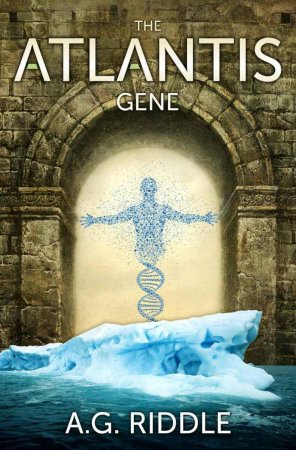 The Atlantis Gene: A Thriller
The Atlantis Gene: A Thriller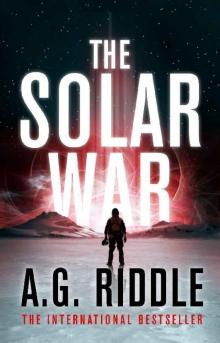 The Solar War (The Long Winter Book 2)
The Solar War (The Long Winter Book 2) The Extinction Files Box Set
The Extinction Files Box Set The Atlantis Trilogy Box Set- The Complete Series
The Atlantis Trilogy Box Set- The Complete Series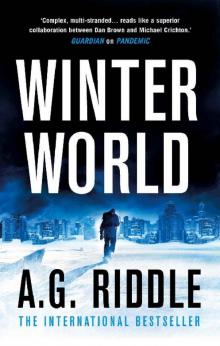 Winter World
Winter World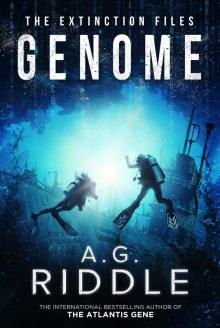 Genome
Genome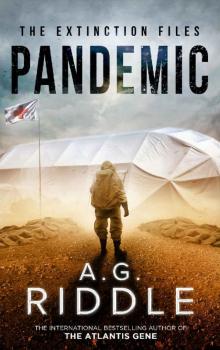 Pandemic (The Extinction Files Book 1)
Pandemic (The Extinction Files Book 1)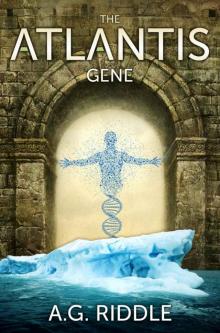 The Atlantis Gene: A Thriller (The Origin Mystery, Book 1)
The Atlantis Gene: A Thriller (The Origin Mystery, Book 1)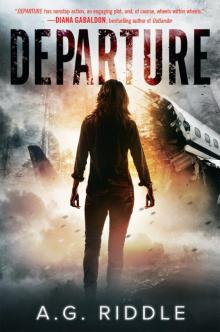 Departure
Departure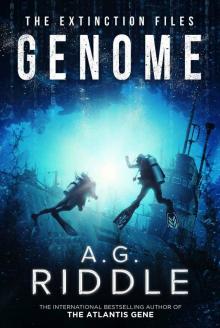 Genome (The Extinction Files Book 2)
Genome (The Extinction Files Book 2) The Atlantis World (The Origin Mystery, Book 3)
The Atlantis World (The Origin Mystery, Book 3)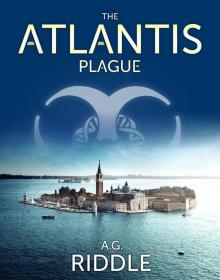 The Atlantis Plague: A Thriller (The Origin Mystery, Book 2)
The Atlantis Plague: A Thriller (The Origin Mystery, Book 2)